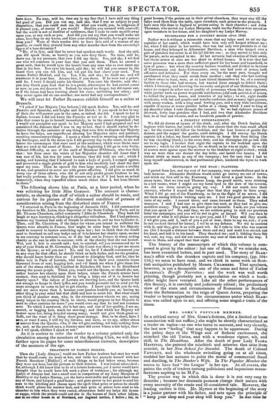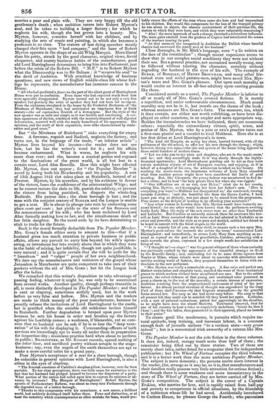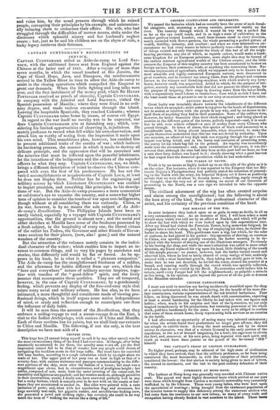MRS. GORE'S POPULAR MEMBER.
IN a critical survey of Mrs. GORE'S fictions, (for a limited or loose examination will not suffice,) she might be shortly characterized as a trader on topics—as one who turns to account, and very cleverly, the last new "feeling" that may happen to be uppermost. During the palmy days of the Whigs and of Reform excitement, she attacked the old Tories, and with a wondrous vigour, wit, and skill, in The Hamiltons. After the death of poor Lady }Ions HASTINGS, she painted the mischiefs and miseries that arise from scandal, in her New School for Scandal. The death of Colonel FAWCETT, and the wholesale swindling going on at all times, enabled her last autumn to point the moral of commercial fraud and duelling, in The Banker's Wife. In The Popular Member she seems to have had" the League" in her eye. At all events, she paints the evils of traders turning politicians and loquacious manu- facturers aspiring to be M.P.s.
The precise way in which this is done it is not very easy to describe ; because her dramatis person te change their nature with every necessity of the crude and ill-considered tale. However, the leading outline is this. Mr. Myrton at the beginning of the story is a junior partner with his father, and acts upon the principle of "keep your shop and your shop will keep you." In due time he
marries a poor and plain wife. They are very happy till the old gentleman's death ; when ambition enters into Robert Myrton's
soul, and be takes to building a larger factory ; for which he neglects his wife, though she has grown into a beauty. Mrs. Myrton, however, consoles herself with her children, and by studying the arts of music and painting, in which she becomes a proficient in no time. The orators of last dying speeches mostly charged their fate upon " bad company." and the bane of Robert Myrton appears in the shape of an old Whig Marquis. More liberal than his party, struck by the good character, original views, fervid eloquence, and county business habits of the manufacturer, good old Lord Harringhurst determines to bring him into Parliament, just before the crisis of the Reform Bill. " M.P." is to Robert Myrton what the Directorship was to Sir Balaam : it "secures his soul" to the devil of Ambition. With practical knowledge of business questions, and new views of English middle-class life whose feel- ings he represents, the manufacturer has immense success in the House.
'All who had predicted a fiasco on the part of the silent guest of Harringhurst House were put to confusion. Even those who had expected much from him were agreeably disappointed. alyrton turned out to be not only a very fine speaker, but precisely the order of speaker they had not been led to expect. From the nickname circulated in the house by Sir Frederick Brabazon, of the Mirabean of Stainhurst,' they had anticipated an impetuous flow of florid oratory—the ad eaptanduni flourish of a demagogue. But the style of the new speaker was as mild and simple as it was forcible and convincing. A cer- tain squareness of diction, combined with the masterly disposal of well-digested information, assorted well with the manly homeliness of his appearance. His opinions, and the mode of their exposition, were alike characterized by mode- ration and good sense."
But " the Mirabeau of Stainhurst " risks everything for empty fame. A foreman, roguish and Radical, neglects the factory, and turns out, in the language of the trade, " an inferior article " ; Myrton lives beyond his income—the reader does not see how, hut he has the writer's word for it ; and his affairs become embarrassed. What is worse, he neglects his wife more than ever; and she, become a musical genius and exposed to the fascinations of the great world, is all but lost to a certain roué, Lord Alan Bonville. How this might have affected Mr. Myrton, does not appear ; for " the Popular Member" is saved by losing both his Membership and his popularity. A sort of 13th August 1842 riot takes place at Stainforth, instead of at Preston. Myrton, by his speeches, and by his evidence in favour of the rioters, loses the confidence of the aristocratical Whigs ; and as he cannot restore the slain to life, punish the soldiery, or prevent the rioters from being punished, he disgusts the whole-hog Radicals. His patron dies ; the close borough is lost ; and the man with the conjoint oratory of SADLER and the League is unable to get a seat. He is about to plunge into ruin by contesting some place conic qui coute ; but yields to the state of his finances and the remonstrances of his wife; who has been reclaimed by Lord Alan formally making love to her, and the simultaneous death of her little daughter. So the novel ends by its hero determining to stick to trade for the future.
Such is the moral formally deducible from The Popular Member. Mrs. Goac's female ethics seem to amount to this—that if a husband gives too much attention to private business or public affairs, allows any pursuit to carry him beyond his wife's apron- string, or introduces her into society above that in which they were in the habit of mixing, her infidelity, though not quite justifiable, is very natural ; and it is quite certain that she will be unfit for the " humdrum " and " vulgar " people of her own neighbourhood. We dare say the manufacturers and ministers of the gospel whose Jerusalem is Manchester are quite competent to take care of their pockets without the aid of Mrs. GORE; but let the League look after the ladies.
We remarked that this writer's disposition to take advantage of passing feeling, whatever it might be, was only to be ascertained from several works. Another quality, though perhaps traceable in all, is more distinctly developed in The Popular Member; and that is cant or claptrap, sometimes artfully used, but in the work before us very false and hollow. Mrs. Myrton and the readers are made to think meanly of the poor manufacturer, because he proudly refuses the invitations of Lord Harringburst to the castle, but is gratified when the amiable old nobleman invites himself to Stainforth. Further degradation is heaped upon poor Myrton because he sets his house in order and brushes up the factory against his Lordship comes ; a weakness, if blameable, yet so com- mon that no husband can be safe if he is to lose the "deep vene- ration" of his wife for displaying it. Commanding-officers of both services are 'exceedingly apt to worry all under them in preparation for inspection-day ; musicians practice hard when about to perform in public; SHAKESPERE, as Mr. KNIGHT records, spared nothing of the labor lima, and sacrificed poetry without scruple to the stage- business ; nay, even the angels of the earth themselves are apt to make a more careful toilet for a grand party.
Poor Myrton's acceptance of a seat for a close borough, though he coincides in general opinions with Lord Harringhurst, is also a -crime in the eyes of claptrap.
"The feverish emotions of Caroline's sleepless pillow, however, were far from enviable. To her clear perceptions, there was little cause for exultation in the fact that her husband had pledged himself to become the dragoman of a party. 'What portion of the nation had called upon him to express its opinions or ad- vocate its interests? The Marquis of Harringhurst 1 Robert Myrton, the apostle of Parliamentary Reform, was about to creep into Parliament through the degraded issue of a rotten borough.
"Thanks to this compromise with his conscience, a new career, a brilliant world, had suddenly developed itself before them. Fame and distinction, or at least the notoriety which contemporaries so often mistake for fame, would pro- bably crown the efforts of the man whose name she bore and had transmitted to his children. But would this compensate for the loss of the tranquil privacy he was about to abjure, the obscure contentment of their previous life, the station to which they were born, and which they were voluntarily renouncing ? 0 Alas the mere approach of such a change exercised a deleterious influence. The mere gales emitted from the gardens of Capreae bad intoxicated the senses of the mariner nearing its port.
"At that moment she recognized in Ambition the Delilah whose baneful charms had enervated the manly soul of her husband."
Close Boroughs, in Mr. Slick's language, were " a lie written on the face of the constitution" ; though recent experience seems to show that in our complex social machinery they were not without their use. But a general practice, not accounted morally wrong, may be followed without tainting the character, certainly without degrading the husband in the eyes of his wife. The example of BURKE, of Rommix, of HENRY BROUGHAM, and many other his- torical stars and social pattern-men, might have saved Mrs. Myr- ton's tears and Mrs. GORE'S phrases. Out upon such morality as would excite an interest in all-but-adultery upon canting grounds like these.
Considered merely as a novel, The Popular Member is inferior to all or nearly all of Mrs. GORE'S avowed fictions. It is merely a repetition, and under unfavourable circumstances. Much sound morality may not be in it, but morals are the theme of the book ; whereas manners are Mrs. GORE'S forte. The manners, too, which it does contain, are either not worth exhibiting, or have been dis- played on other occasions, in an ampler and more appropriate way. Besides the inconsistencies we have indicated, there are numerous others; especially the extraordinary virtues, spirit, sense, and genius of Mrs. Myrton, who by a year or two's practice turns out a first-rate pianist and a vocalist to rival Malibran. Here she is at her first debut at Lord Harringhurst's in town.
"The kind old Marquis, on seeing her alone, hurried forward, with all the politeness of the old school, to offer her his arm through the throng ; which, however, throng was none,—the size and system of the house being opposed to those social blunders of modern times.
"' Let me take you to my niece and daughter, who are in the music-room,' said he : and they accordingly made their way slowly through the highly- decorated apartments ; Lord Harringhurst pointing out to her as they went certain matchless objects of art of European renown, and enjoying, as if in behalf of a daughter of his own, the admiration lavished on her beauty. On reaching the music-room, the impetuous welcome of Lady Mary exceeded what from another person might have been considered the limits of good breeding. But, like Cleopatra, the young heiress was accustomed to find de- fect a virtue, and to hear 'the holy priests bless her when she was riggish.'
"' Our difficulties are at an end, dear Helen! ' cried she to her cousin, seizing Mrs. Myrton, and disengaging her from her father's arm. 'Here is everything you want !—Malibran has disappointed us,' she continued, turning towards Caroline ; 'and the beautiful trio from the Gazza Ladra, I have heard you sing so divinely, was just about to be erased from the programme. Pray secure us the delight of hearing if, by affording 'your assistance? '
"Any other woman in London than Mrs. Myrton would have instantly ex- cused herself; for any other would have known that the performers awaiting beside Lady Mary the reply of the new comer were no other than Tamburint and Lablache. But Caroline as naturally mistook them for amateurs like her- self, as Lady Mary conceived that the voice she had admired in Yorkshire as so sweet and powerful, and the style as so pure and decided, entitled her friend to be heard in concert with the finest singers in the world.
It is scarcely fair of you, my dear child, to impose ouch a tax upon Mrs. Myrton's good-nature the moment she enters the room,' remonstrated Lord Harringhurst: and immediately, to screen Lady Mary from anything so un- usual as reproof on the part of her grandfather, Caroline, advancing with a smile towards the piano, expressed in a few simple words her satisfaction at being of use. I thought so !—a singer!' was the general whisper of those whose curiosity was previously excited by the appearance of the beautiful stranger so feted by the Bonville family ; and, concluding her to be some divine signora from Naples or Milan, whose talents were about to convulse with admiration our novelty-seeking world of fashion, they prepared themselves to listen with en- thusiasm to the new performer. "Mrs. Myrton was really a remarkable singer. A fine voice and perfect ear, distinct enunciation and exquisite taste, supplied the want of those mechanical graces to which modern virtuosi have accustomed our ears. But to the artists present, the velvet richness of that young and unstrained voice possessed as great a charm as, to the rest of the assembly, a certain fervour of expression, doubtless resulting from the unprecedented excitement of mind of the per- former. An almost poetical elevation of thought was engendered by the coup d'ceil of those chef-d'ceuvres—by that fragrant atmosphere—by the graceful forms around her. She sang as she had never sang before. She sang so that all present felt they could not be satisfied till they heard her again. Lablache, with a sort of paternal enthusiasm, patted her approvingly on the shoulder, as he might have done the absent Marietta. Tamburini observed, that for one of his country to hear a voice so exquisitely melodious, faisait du been a. Fame '; and the fine ladies, thus guaranteed in their approval, placed no bounds to their praise." To create genii like mushrooms, in pursuits which require na- tural aptitude, long training, and incessant labour, is a common enough fault of juvenile authors "in a verdant state—very green indeed" ; but is a nonsensical trick unworthy of a veteran like Mrs.
GORE.
The Popular Member is not the sole fiction in the three volumes. It does not, indeed, occupy much more than half of them ; the remainder being filled out by three stories. Two of these are merely short tales, rather fitted for a magazine than for independent publication ; but The Wheel of Fortune occupies the third volume, and it is a better work than the more ambitious Popular Member. The subject is more domestic ; the persons excite more interest in the reader, (for, strange as it may be, so it is, that manufacturers and their families really possess very little attraction for serious fiction); and though there is some weakness and some inconsistency in the story of The Wheel of Fortune, they are better carried off by Mrs. GORE'S composition. The subject is the career of a Captain Erskine, who marries for love, and is rapidly raised from half-pay and poverty to competence in official situations, by the friendship of a nobleman whose life he had saved. Accidentally introduced to Carlton House, he pleases George the Fourth ; who patronizes
and ruins him, by the usual process through which he ruined people, corrupting their principles by his example, and unintention- ally inducing them to embarrass their affairs. His wife, who had struggled through the difficulties of narrow means, sinks under the distresses which splendid misery and her husband's neglect create ; but, just as he and his children are on the abyss of ruin, a lucky legacy retrieves their fortunes.




























 Previous page
Previous page